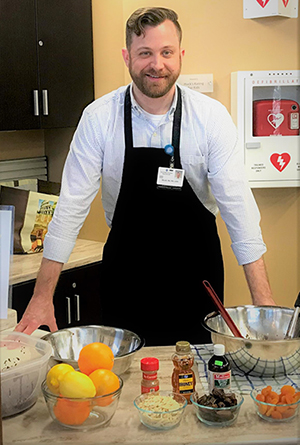Main Content
Dietetic Internship
In order to become a Registered Dietitian Nutritionist (RDN), candidates must complete 1200 hours of supervised practice in a program accredited by the Accreditation Council for Education in Nutrition and Dietetics (ACEND). The Dietetic Internship Program at SIU satisfies this internship requirement to prepare candidates for the credentialing exam required to become an RDN.
The Dietetic Internship program is a 12-month experience offered in conjunction with a Master of Science degree in Human Sciences. The program prepares students to be competent entry-level registered dietitian nutritionists with the knowledge and skills necessary for success in the emerging roles in diverse settings. The program will prepare students with a strong foundation that will allow them to contribute to evolving opportunities in a dynamic profession. Students will develop skills in the areas of medical nutrition therapy, community nutrition, and food service management. Students benefit from a low student to faculty ratio in the graduate program.
Supervised practice experiences provided during internship rotations hold more meaning for you than didactic learning alone. Rotations complement graduate coursework and prepare you for roles as competent, entry-level dietitians. Within the 1200 hours of supervised practice hours, you will assess food and nutrition needs for individuals and communities. You will also be involved with planning, organizing, managing, directing, coordinating, and evaluating nutritional components of health services for individuals and communities.
Dietetic Internship Director
Brenda Green, MS, RDN, LDN, CLC
Quigley Hall, Rm 209 – MC 4310
Email: bgreen@siu.edu
P: 618-453-7513

"The Combined Master’s Program at SIU was the catalyst I needed to work in the field. The core classes and internship placement prepared me to do the job I love." -Micah Pierce
The SIU Dietetic Internship requires the following:
Rotation Schedule
The supervised practice includes three rotations. These rotations provide knowledge and training in nutrition assessment, health promotion and disease prevention in professional settings including clinics, health departments, hospitals, schools and long-term care facilities.
- 6 weeks in food service management
- 12 weeks in clinical/medical nutrition therapy
- 10 weeks in community
- 2 weeks of intern's choice*
*The intern's choice can consist of: oncology, leadership, out patient, bariatrics, pediatric, nutrition support, and sports nutrition.
Application Timeline
Southern Illinois University Carbondale Dietetic Internship Program participates in the spring application cycle with the program starting in fall.
Application review and program admission will be completed on a rolling basis beginning September 1st and will continue until all available slots are full. You are encouraged to submit your application early.
- Application Opens: August 5th
- Application Deadline: January 31st
- Program Decision Date: March 1st
- Applicant Decision Date: March 15th
Submit your application materials via DICAS anytime from August 5th through January 31st. The selection committee will review applications on a monthly basis. Qualified candidates will be invited to complete a virtual interview. Once the selection committee has made a decision, you will be notified via email of your application status (no later than March 1st). Students will have until March 15th to accept or decline an offer.
Our program is committed to following ACEND’S Code of Conduct and Traffic Rules. You are expected to follow ACEND’s Code of Conduct and Traffic Rules for Applicants.
Who's hiring our graduates?
- Barnes-Jewish Hospital (St. Louis)
- St. Francis (Peoria)
- Loyola University Chicago
- Rush-Presbyterian-St. Luke's (Chicago)
- University of Indiana Hospital
- Southern Illinois Healthcare
- Vanderbilt Medical Center
- VA Health Care
- State and Federal Government
- SIU and other universities
- Local Health Departments
- Mercy Hospital
- Bariatrics Facilities
- Pediatrics Hospitals
- Renal Facilities
- Pharmaceutical companies
- and many others



